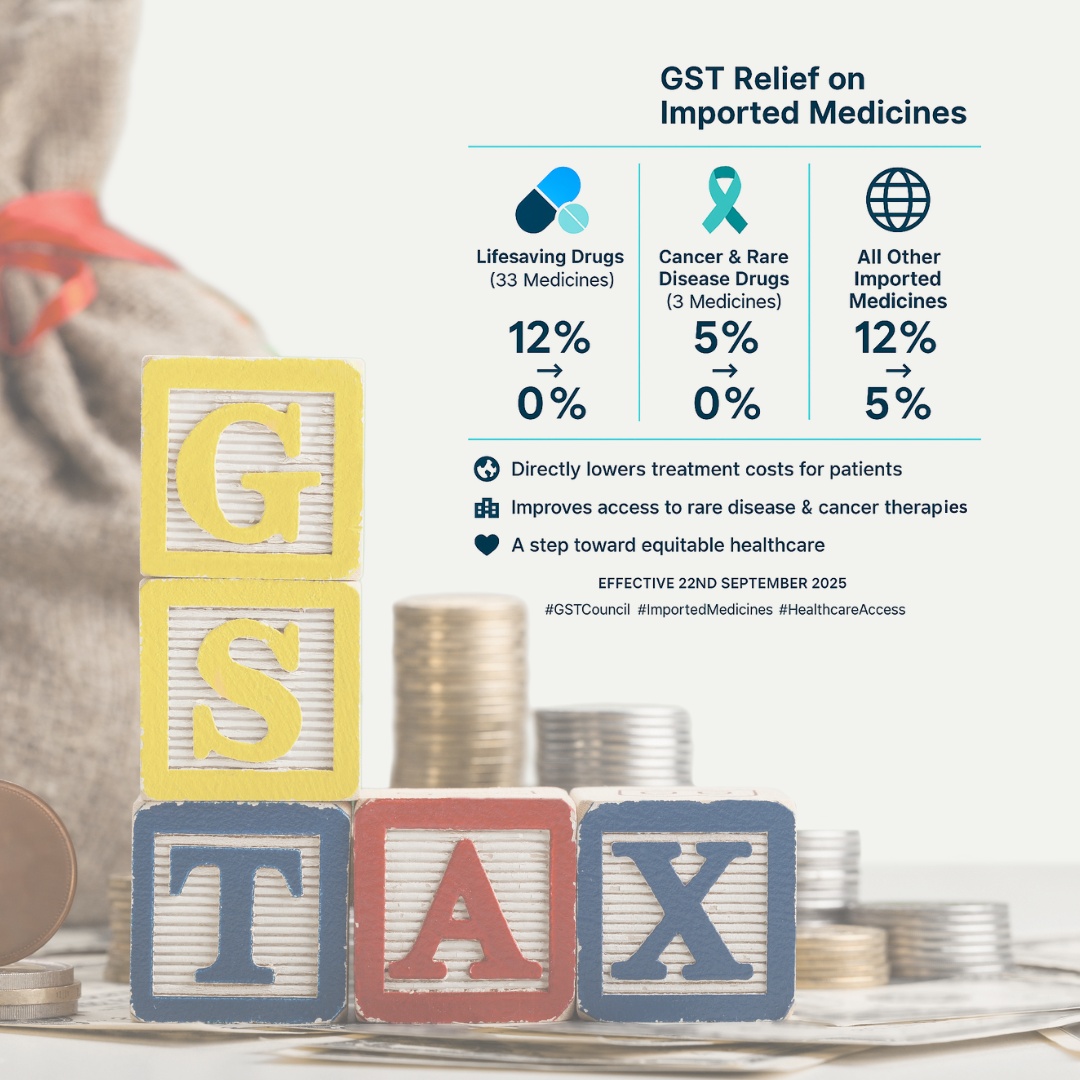India Cuts GST on 36 Lifesaving Medicines: Relief for Patients

The 56th meeting of the GST Council, chaired by Union Finance & Corporate Affairs Minister Nirmala Sitharaman in New Delhi, has introduced a significant reform for the healthcare sector. The Council has announced a waiver of GST on 36 lifesaving drugs and a reduction of GST rates on medical devices and essentials, effective from 22nd September 2025.
As a pharmaceutical company committed to improving patient access, we welcome these reforms, which align with the government’s vision of “Next-Generation reforms in GST” as announced by Prime Minister Narendra Modi in his Independence Day address.
Major GST Relief for Lifesaving Medicines:
The Council has completely waived GST on three rare disease and critical care medicines:
- Agalsidase Beta
- Imiglucerase
- Eptacog alfa (activated recombinant coagulation factor VIIa)
Earlier taxed at 5%, these therapies are essential for patients battling rare diseases and bleeding disorders.
In addition, 33 other lifesaving drugs have seen their GST rates reduced from 12% to 5%. These include critical medicines used in oncology, rare diseases, and chronic conditions such as:
- Onasemnogene abeparvovec (gene therapy for SMA)
- Asciminib (CML therapy)
- Mepolizumab (severe asthma treatment)
- Pegylated liposomal irinotecan (cancer therapy)
- Daratumumab & Daratumumab Subcutaneous
- Teclistamab, Amivantamab, Alectinib, Risdiplam
- Obinutuzumab, Polatuzumab Vedotin, Entrectinib, Atezolizumab
- Spesolimab, Velaglucerase Alpha, Agalsidase Alfa
- And several other advanced therapies
This move directly benefits patients by lowering treatment costs for cancer, rare diseases, and life-threatening chronic illnesses.
Relief for Medical Devices & Essentials:
Alongside medicines, the Council has recommended lower GST rates on medical devices and health essentials:
- GST on various medical apparatus and devices (surgical, dental, veterinary, and diagnostic equipment) has been reduced from 18% to 5%.
- GST on items like bandages, gauze, diagnostic kits, reagents, blood glucose monitors, and medical supplies reduced from 12% to 5%.
- Spectacles and goggles also see GST rationalization to 5%.
This is a long-awaited step that the medical devices industry has been seeking to ease taxation and improve affordability for patients.
Why All Medicines Are Not GST-free:
While many have asked why all medicines are not fully exempt from GST, the Ministry of Finance clarified that complete exemption could actually increase costs.
If GST were fully waived, manufacturers and distributors would lose the ability to claim Input Tax Credit (ITC) on raw materials. This would raise production costs, which in turn may be passed on to patients, making medicines more expensive instead of cheaper.
Hence, the 5% GST rate is retained to balance affordability for patients and sustainability for the industry.
Impact on Patients & the Industry:
Patients:
- Lower treatment costs for rare diseases, cancer, and chronic conditions.
- Reduced expenses on diagnostic tools and essential medical devices.
Healthcare Industry:
- Relief from long-standing demand for GST rationalization.
- Continued access to ITC, ensuring sustainability in production.
- Process reforms for faster refunds of accumulated ITC under the inverted duty structure.
Pharmaceutical Companies (like us):
- Easier compliance under GST.
- Stronger ability to ensure affordable, reliable access to medicines.
- Encouragement to collaborate with government initiatives for better patient outcomes.
- Our Perspective as a Pharmaceutical Company:
As part of the pharmaceutical industry, we view the GST relief on lifesaving drugs and medical essentials as a welcome step. The decision will reduce the financial burden on patients and improve access to critical therapies, while also providing greater clarity for manufacturers and distributors under the GST framework.
Moving Towards Affordable & Accessible Healthcare:
The GST Council’s reform is not just a tax change—it is a patient-focused measure aimed at reducing healthcare costs, improving access to essential medicines, and supporting both patients and the pharmaceutical industry.
By balancing affordability with sustainability, the government has ensured that the healthcare sector can grow while serving patients better. For companies like ours, it reinforces our role in delivering safe, compliant, and affordable therapies globally.
References:



